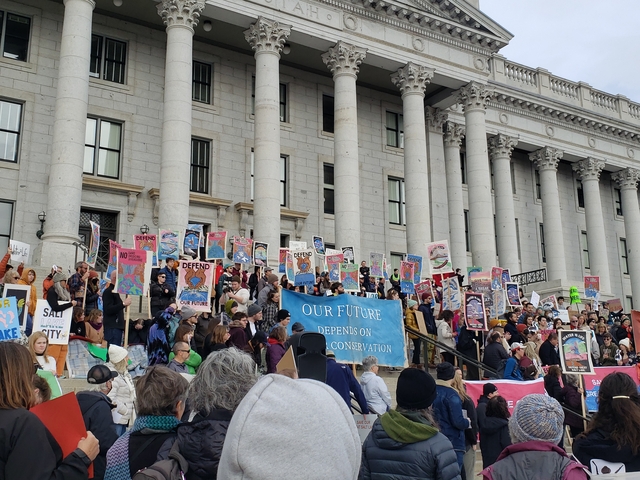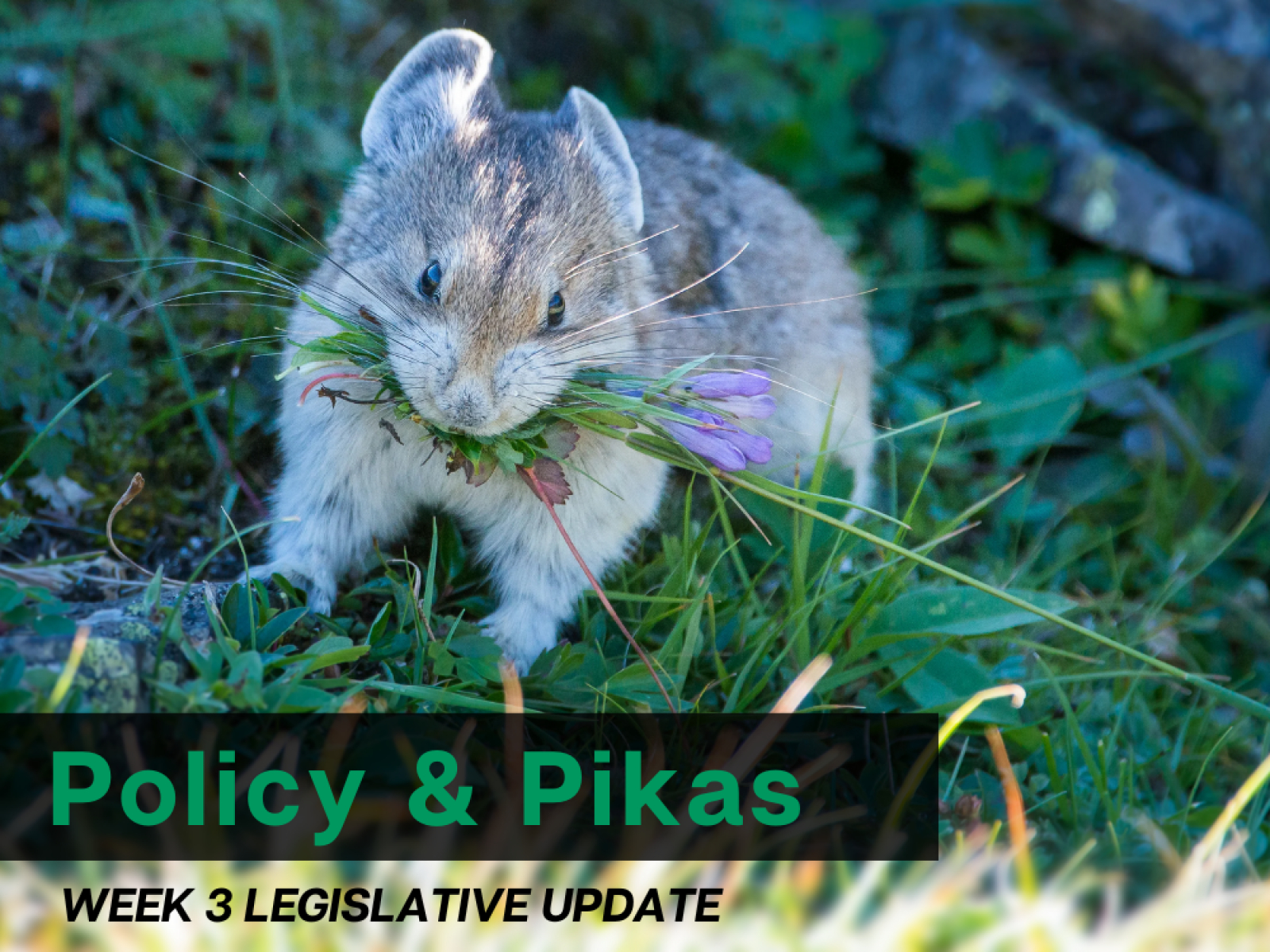Week 3 is Water Week. Legislators discussed several big water bills that had us on the edge of our seats, ranging from a bill that would mandate Salt Lake City to route water to dry lots in the Wasatch Mountains (HB 276) to an attempt to set a target elevation for the Great Salt Lake (SCR 06). We also heard a strange proposal for thinning our forests as the most viable option for replenishing the Great Salt Lake. We’ll go over it all, but first, let’s take it back to the beginning of the legislative session.
Saving the Great Salt Lake
On January 14th, crowds rallied for better policies to protect the drying Great Salt Lake. The rally was organized by the organization Save Our Great Salt Lake. Concerned citizens, ranging from poets and snowboarders to business owners and tribal leaders, voiced their concerns.
Replenishing the Great Salt Lake to healthy levels is crucial for the Wasatch Mountains and all the life that depends on it. The Great Salt Lake shrinking means less snow because as storms pass over the Great Salt Lake, they absorb some of its moisture, which then turns into snow on the mountains - a shrinking lake jeopardizes that pattern.
Toxic dust storms that will arise from a drying lakebed will also create an undesirable feedback loop. As dust particles settle on snowpack, the darker snow will melt faster, which is a concern for our water supply.

We support solutions that will conserve and route more water to the Great Salt Lake while protecting our watershed. To our dismay, legislators failed to pass SCR 06, a resolution that would have set a minimum healthy target elevation of 4198 feet for Great Salt Lake.
HB 276 Water Supply Amendments: Tabled
It’s not all just a drop in the bucket. On February 2nd, the House Natural Resources Committee tabled Rep. Lyman’s HB 276 Water Supply Amendments bill. A huge thanks to everyone who sent emails and showed up in person to testify against this bill. Your voice matters and we love hearing from you!
This bill would have required Salt Lake City to supply water outside of its service area to dry lots in the Wasatch Mountains and canyons, either by routing water up the canyons or diverting it directly from streams. If the city refuses or is unable to route the “necessary” water, Salt Lake City would be required to purchase the lot from the owner.
We opposed this bill for the following reasons:
- Less water will make it to the Great Salt Lake, as more diversions are created in the Wasatch Mountains. This undermines efforts to restore the lake to its healthy levels.
- Salt Lake City water rate payers may face a less reliable water supply. Diversions change nutrient flow, water flow, and water chemistry while altering the riparian habitat of rivers and streams.
- Residents in SLC’s service area will face rising water prices, as the city seeks out new sources of water or attempts to offset the cost of purchasing lots and inevitable litigation.
If you’d like to learn more about HB276, check out our action alert from earlier this week. You can sign up for our alerts here.
Trees aren’t the problem
On January 31st, the Salt Lake County Council heard a presentation from Councilwoman Dea Theodore representing District 6 on how thinning trees can single-handedly restore the Great Salt Lake. She also claimed that any urban or agricultural conservation efforts would have little to no impact. We wholeheartedly disagree.
Trees are essential in the Wasatch Mountains. Trees reduce ambient temperatures, purify our watershed, and provide a complex network in the soil that supports biodiversity of life and leads to water retention. In a recent study by USFS and USU, researchers found that in drier, more arid climates, forest thinning can actually reduce the amount of water that makes it downstream.
Our forests play a critical role in our watershed and we should strive for greater resilience, especially in the face of a changing climate and growing development pressures. Our forests and watershed need stewardship that restores forests to their natural and native conditions for the sake of maintaining a healthy watershed.
On Tuesday February 7th, the Salt Lake County Council will host a 45-minute informal presentation on water conservation and forest management, as a follow-up to Councilwoman Theodore’s proposal.
Featured panelists are as follows:
- Laura Briefer (Director of Salt Lake City Department of Public Utilities)
- Ben Abbott (Professor of Environmental Science and Global Hydrology at Brigham Young University)
- Rebecca Hotze (District Ranger for the Salt Lake Ranger District with the Forest Service)
Stay involved and use your voice!
Want to meet your legislators and engage with them on issues that you care about? Come join us next week at the Capitol! We’d love to connect with you and help connect you to your legislators.
On Thursday February 9th, our staff will be at the Capitol for Nonprofit Day on the Hill. Come say hi - we’ll be tabling at the Capitol Rotunda from 11am to 2pm. We will also be at the Capitol on Friday February 10th for Outdoor Recreation Day.
Our primary areas of focus are the gravel pit proposal in Parley’s Canyon, the gondola proposal up Little Cottonwood Canyon, and any water-related bills impacting the Wasatch Mountains. We’ll have talking points and handouts on these issues for your convenience!
Pika Fact of the Week: Pikas have tails that are entirely concealed under their dense fur.


